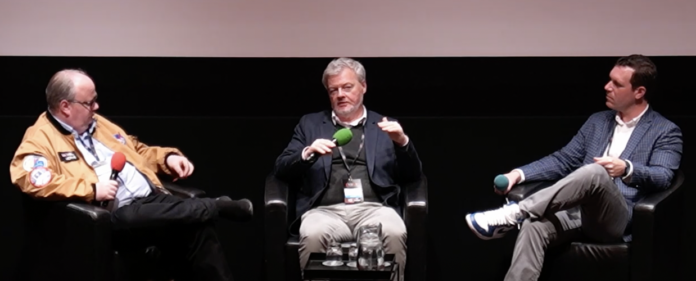Facing challenges at every layer of technology and business, operators need a “silver bullet machine gun”
The world of operators is confusing at the moment. Networks are rapidly changing, business models need to change just as rapidly, money is tight and return on the billions poured into 5G remains elusive. There’s a growing chorus that traditional integrated service providers need to undergo a drastic reinvention. But whether that’s an effort to become more like the massive technology companies like Google or Facebook or a more back to the basics approach remains open for debate.
This broad topic was the focus of RCR Live: Telco Reinvention held earlier this year in London. To examine the big picture, we asked Juniper’s Neil McRae, formerly the chief architect at BT, and Bain & Company Expert Partner Brendan O’Rourke, formerly of the BT and Telefonica C suites, to sketch the problem and point to possible solutions. Both industry veterans identified a disconnect between network technology and what customers want as a core problem.
Starting at the macro level, O’Rourke said telcos are facing changing customer expectations, the emergence of platform-based economies, and a partner/compete dynamic between operators and hyperscalers—”They’re in. They’re not coming. They’re in.” All told, “I think that there are threats to a telco at every single level from the customer all the way down to the infrastructure…We need a strategy. Maybe we need four strategies or five strategies on how to deal with each of those threats at each layer.”
McRae called for more bravery and willingness to experiment in services, citing historic instances where operators had big, impactful ideas that they couldn’t get to market leaving a void for other firms to fill. There was a time, he said, when a new digital service came out and telcos were the presumed provider. “I think the telcos still expect to be the only player giving those services to customers and that’s just totally unrealistic.” It’s not about making sure the network is OK, he said. It’s about making sure the customer is OK.
Lessons operators can learn from hyperscalers
You go to a hyperscaler, McRae said, “and all of them are really thinking about [customers] in a much deeper way than any telco is. [Operators] need a silver bullet machine gun.”
Looking for a way ahead, O’Rourke said it was clear to him that the future isn’t about integrated telco organizations. He referenced private networks, B2B services and the Internet of Things each as technology platforms that could be their own businesses, but not necessarily all within a larger telco. “It’s not about becoming a techco,” he said. “It’s about recognizing that the integrated telco is probably dead and so how do you create those different businesses?”
McRae admitted that he struggled with a way forward, in part because different directions require different types of investors. And, he said, investors aren’t particularly fond of telcos. He said telcos have built their brands on reliability, scalability and repeatability, so a good place to start is identify services that benefit from those traits. “Is it gonna be easy? No. Are you gonna have to really get a hold of the customer experience?…Absolutely.
Again drawing a comparison with how hyperscalers think and work, he noted that Google doesn’t have thousands of people running around keeping datacenters online; that has been largely automated. For telcos, this means “get the whole bottom layer of infrastructure super automated, on demand, API-driven, then telcos can focus on the sort of network as a service layer.”

